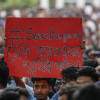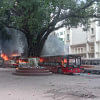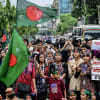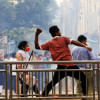What are the global stakes of Bangladesh's current crisis?

In light of Bangladesh's student protests and the government's response that has brought the nation to a standstill—with violence, mounting death toll, and a brutal crackdown—Michael Kugelman, director of South Asia Institute at the Wilson Center, talks to Ramisa Rob of The Daily Star about the implications for the country on the international front.
As an observer from outside, but one specialising in South Asia, did you expect the student protests for quota reform to escalate to one of the biggest challenges that the Awami League government has faced?
It was surprising. There have been plenty of protests during Awami League's regime over the last 15 years, but nothing as large, long, and violent as this one. That's likely because there was a perfect storm this time around: an unpopular court decision, an especially ferocious government response—incendiary rhetoric along with violent actions of great scale—a deep repository of pent-up public anger and grievances against the state, and growing economic stress that accentuated the public's grievances.
Can you describe the international response towards the spiralling situation and particularly the government's handling of student protests from the beginning?
There have been expressions of concern from the UN, some lawmakers, and some leaders around the world, especially in the West. And there have of course been strong condemnations from the international media and human rights groups. But on the whole, the international response, especially from foreign governments, has been rather muted.
Some may find this relatively restrained international response to be puzzling, given the scale and egregiousness of the violence. There are several reasons for it. One is quite simple: the world is on fire, and with multiple major wars playing out, an internal crisis in Bangladesh won't register high on many radars. Another reason is very practical: many governments prefer to keep a low profile and say little publicly at such a dangerous and volatile moment in Bangladesh, to avoid any risks to their nationals and interests in the country.
But let's be clear: many governments, including in the US, are concerned. Bangladesh may not be a major power, but it's a consequential and strategically significant player, especially in an era of intense great power competition. It's also a top global economic player. From the international community's perspective, there's a lot at stake with Bangladesh, and when it's convulsed by unrest and uncertainty, that doesn't serve anyone's interests.
What do you make of the government's narrative that the protests were orchestrated by the opposition parties from the beginning, and is it of concern internationally?
I know this is the narrative the government is trying to project, but aside from the hardcore Awami League support base and certain constituencies in India, I don't think anyone is buying it. The protests were organised and spearheaded by members of the public, not political parties. They were led by students, not political partisans. This isn't to say opposition forces didn't exploit and infiltrate the protests—I'm sure they did, given the opportunity it provided. But these were public protests led by student leaders.
It's a painful truth for the Awami League that there were mass displays of public anger against the government. That's a big reason why it has put out the narrative that it has: by blaming it all on the opposition, you try to hide the reality that many Bangladeshis—common people, not political partisans—seem to be fed up with the government.
In January, after the US deemed the election was not "free and fair," you had written that Bangladesh remains a "test case" for US value-based foreign policy in a world where realpolitik often prevails. Do you think the current situation will have an impact on the US approach?
This crisis will, I think, validate those in the US government that believe that rights and democracy should remain a focus of the policy towards Bangladesh. And it presents a challenge for those in Washington charged with focusing more on the interests-based part of the relationship—scaling up economic cooperation, furthering strategic collaborations, and so on. If the crisis recedes and instability subsides relatively soon, it will be easier to get back to that balance of values and interests that the Biden administration has sought to strike post-Bangladesh election, with the letter that was issued in February. But prolonged unrest and crisis will make that much tougher to pull off.
This crisis could have a big impact on one particular key US policy: sanctions on Rab. The US has said in recent weeks that it has no plans to remove those sanctions. But events of recent days, especially if the US concludes Rab was involved in the unlawful use of force during the protests, will make it even more unlikely that those sanctions will be removed anytime soon. Additionally, we've seen over the last year some US visa restrictions that targeted those that undermined the election process. So, we can't rule out additional visa restrictions that target those linked to the illegal uses of force during the protests.
What would you think are the general concerns of this ongoing unrest and instability for nations that have economic and political ties with Bangladesh?
Stability risks are a major problem for countries with both economic and political ties with Bangladesh. Countries and investors operating commercially in Bangladesh have already been spooked by the scale of the violence, and they'll be nervous about the possibility of additional flare-ups down the road. And the sense of uncertainty about what could be coming next will add to that sense of anxiety. This isn't good for Bangladesh, especially as it's already dealing with growing economic stress and badly needs course corrections that include more FDI flows.
Bangladesh's diplomatic ties could also be hampered, and especially in a worst case scenario where foreign governments scale down their diplomatic presence due to extended security concerns. That would make diplomatic relations more difficult. And that would be quite disappointing for a government—and a ruling party—that has long prided itself on its ability to conduct relations with countries across the board, and navigate fierce geopolitical competition, come what may. Let's be clear: it's hard to show "friendship to all, malice towards none" if many of your friends are taking a step back due to security concerns.
What do you believe are the geopolitical implications for Bangladesh's reputation from this current movement? Is there any way to turn back the clock at this stage?
Bangladesh's global reputation and image have taken serious hits. But I wouldn't overstate the geopolitical implications of this. The Chinas, Russias and Indias of the world, and much of the Global South, won't let the internal policies of the Bangladesh government—including and especially the use of repression—impact their relations with it. I envisage a fair degree of continuity in policy.
Whether Bangladesh's relations with the West will face any consequences remains to be seen. These relations will largely be impacted by how long this crisis plays out. A prolonged crisis, and especially one that involves more state repression, could pose a challenge to Dhaka's relations with the West—from its efforts to earn more trade privileges from the EU to prospects for arms sales with the US and others. At the end of the day, the West—including the US—won't be stopped from engaging with Bangladesh if strategic interests warrant that engagement. But this has been an especially serious crisis, with especially grave concerns about the actions of the Bangladesh government and state actors.
If the situation were to calm down, do you expect a major shift in the strategic significance of Bangladesh, especially in regard to the nation's position as a key battleground for great power competition?
That strategic significance will remain entrenched, regardless of whether and when the situation calms down. Bangladesh's location, size, economic status, and relations with great powers are constants that won't be impacted by prolonged instability.
But there's a cautionary tale here. India has been successful in leveraging its own strategic significance, ensuring that the West remains closely engaged with it despite concerns about its domestic policies. Bangladesh is also strategically significant, but not so much that the US was willing to hold back from pursuing tough policies—including sanctions—that risk aggravating relations. In effect, Dhaka can't use its strategic significance as a shield, in the way that New Delhi can.
Views expressed in this article are the authors' own.
We welcome your contributions and analysis of global events. To submit articles to our weekly page, Geopolitical Insights, please send an email to [email protected]
Follow The Daily Star Opinion on Facebook for the latest opinions, commentaries and analyses by experts and professionals. To contribute your article or letter to The Daily Star Opinion, see our guidelines for submission.


 For all latest news, follow The Daily Star's Google News channel.
For all latest news, follow The Daily Star's Google News channel. 








Comments